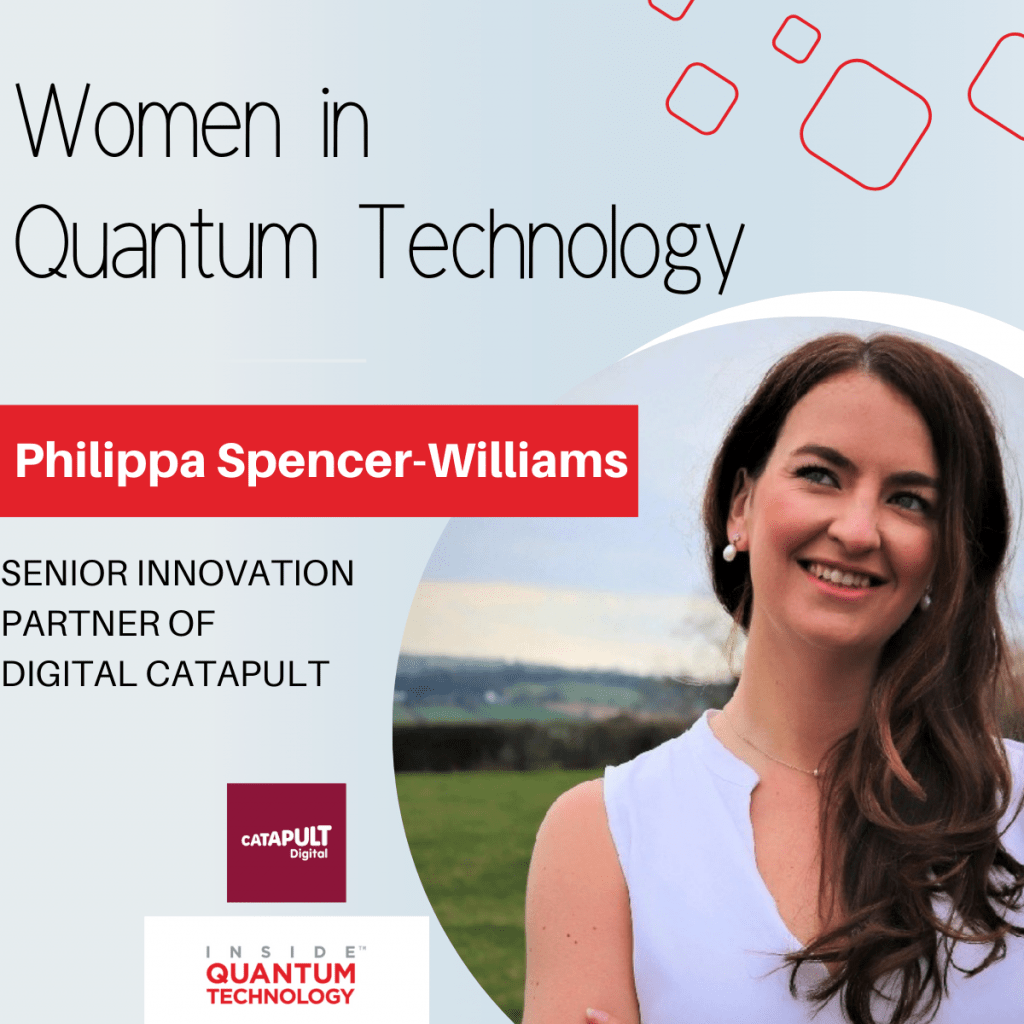Within the quantum industry, you’ll find some individuals, like Phillipa Spencer-Williams, the Senior Innovation Partner of the UK company Digital Catapult, who are interested in the trends of emerging technologies and their potential applications. “Advanced Digital Technology is the future of our society with so much potential to make real step changes in some of our biggest environmental and economic challenges,” Spencer-Williams told Inside Quantum Technology. “Quantum Technologies really interest me because of the wealth of applications and the opportunities they bring, from Quantum Computing solving some of our most complex analytical challenges to quantum sensing, providing more accurate and sensitive sensing capabilities. I love to see something I studied as part of my degree (and what felt near impossible to get my head around) translate into real-world applications.”
After obtaining a degree in physics from the University of Liverpool in 2012, Spencer-Williams quickly became interested more in the technological aspect of physics and less in the pure scientific theories of the field. She then got her master’s degree in aerospace engineering from the University of Liverpool before working at Rolls-Royce for seven years.
While working at Digital Catapult, a UK innovation agency, Spencer-Williams had a perspective shift during the pandemic. She explained: “Nearly 3 years ago, I took a sideways step into the technology sector as I was keen to explore how technology can be translated into industry. Given my physics background, I was given our quantum portfolio to manage – and I honestly think it is one of the best things that has ever happened to me. The technology fascinates me, and I love working across the UK ecosystem to explore the opportunities and challenges faced.”
Now, as the Senior Innovation Partner for Quantum & AI at Digital Catapult, Spencer-Williams has a front-row seat to view how quantum technology is changing various other industries. “My role is supporting the translation of emerging digital technology from research into business applications,” Spencer-Williams said. “I am leading Digital Catapult’s Quantum Innovation & AI portfolio, working with industries to identify the opportunities that Quantum & AI technology will bring and the importance of early engagement with the technology through collaboration across the ecosystem.” With some of the world’s top universities and research institutions, the UK has no shortage of opportunities for Spencer-Williams to investigate.
As her job offers a multidisciplinary approach, Spencer-Williams better understands how diversity and inclusivity can affect a growing ecosystem like the quantum industry. “A report published by Digital Catapult and Beauhurst explores the founder diversity in the UK advanced technology landscape,” she elaborated. “In 2022, ‘mixed-gender teams secure the majority of total funding (61.9%)’, a shift from the previous decade with ‘all-male teams attracting most of the investment.’ The report said there is still a huge discrepancy ‘with mixed-gender and all-female founded companies representing 14.7% and 4.41%, respectively’.”
Spencer-Williams highlighted other aspects of the recent report: “The report also sheds light on other demographic areas such as age, ethnicity, nationality & educational background. Like all diversity challenges – we need to start with education & interest at an early age, showcasing the vast careers within the quantum technology field that stretch far beyond the technology developers. Access to a share of the ‘£ 2.5 billion’ investment in quantum needs to be easy to navigate and accessible to all from different backgrounds.”
Kenna Hughes-Castleberry is the Managing Editor at Inside Quantum Technology and the Science Communicator at JILA (a partnership between the University of Colorado Boulder and NIST). Her writing beats include deep tech, quantum computing, and AI. Her work has been featured in Scientific American, Discover Magazine, New Scientist, Ars Technica, and more.
